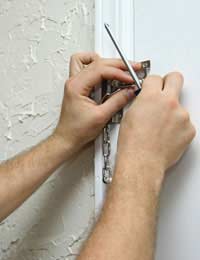 As we reach our later years we can start to feel more vulnerable within our homes. Often, this is simply due to us being less mobile and more at risk of suffering a fall slip or trip but there are other factors which elderly people and their families should also consider.
As we reach our later years we can start to feel more vulnerable within our homes. Often, this is simply due to us being less mobile and more at risk of suffering a fall slip or trip but there are other factors which elderly people and their families should also consider.
Falls, Slips and Trips
Accidents in the home unfortunately tend to occur more frequently and become more distressing as we get older. Falls, slips and trips are the most common cause of physical injury to the elderly but the risks of them occurring can be reduced if we take some precautionary measures.
Handrails in all the key locations such as the stairs, front and back doors and the bath and toilet can make keeping your balance much easier and you should also ensure that any rugs you use in these kinds of areas have non-slip mats underneath them. Better still, if you can live without a rug, that’s even better as, even with slip mats, the corners of a rug can become worn and turn upwards over time which is a potential trip hazard. Keep all of the rooms well lit. In dimly lit rooms, it may be difficult to see any hazards so you should use bulbs which are 100W. Low energy light bulbs might seem expensive but they’ll last far longer than conventional light bulbs and the additional expense is worth it.
Keeping a generally tidy and orderly home is also important. This doesn’t necessarily mean vacuuming and polishing every day but simple things like keeping any wires that you could trip over hidden away and keeping a storage area, perhaps a spare room, in which you can store all of your clutter. Not only will you find things more easily if they’re all in the same place, it will stop you tripping over them. Moping up all spills immediately will also reduce the chances of slipping. You should also remove any casters from furniture where possible. This will make furniture more stable for you to hold onto for balance or to lean against. And, always seek help if you’re uncertain about taking on a particular chore in the house. For example, putting up curtains or changing light bulbs. Providing you’re not disabled, you should try to keep as active as possible as regular exercise improves balance, co-ordination and strength.
Keeping Warm
Elderly people are often most at risk of suffering from illness due to cold weather and many pensioners struggle to keep up with the fuel bills, particularly in the winter. Ways of ensuring that you remain as warm as possible and to manage your fuel consumption more economically include wearing several thinner layers of clothing as opposed to one thick layer as warmth is retained better between several layers. Keeping a woollen or some other type of warm hat handy, no matter whether you feel silly or not, will also help your body to retain more heat. You should always try to have at least one hot meal per day and have regular hot drinks throughout the day. A hot drink, especially before bedtime, helps to keep your body temperature up and it’s often a good idea to take a thermos flask to bed so you can have a hot drink in the night if you wake up feeling cold.
Sitting still for long periods can also make you feel cold so, if you’re able, try to build some kind of exercise into your day. This is not only good for your mobility but will help you stay warm too. There are other practical things you can do to keep your home warm. Insulation, draught proofing and lagging pipes all help to stop the heat from escaping and sometimes you can get financial help from your local authority to help you with this. And, if you have central heating, it’s more economical to set the time for the heating to come on a bit earlier than to push the thermostat up higher.
Security
It’s a sad fact of life that burglars and intruders see frail and elderly people as ‘easy targets’ so it’s crucial that you take security measures to reduce the risk of becoming a victim. It doesn’t take a burglar more than a few minutes to access your property, steal valuables then leave so always lock your doors and any windows and don’t be tempted to leave them unlocked just because you’re ‘popping next door or to the corner shop’ for a few minutes. Don’t be tempted to leave a spare door key in a ‘hidden’ place. No matter how well you think you’ve hidden it, burglars will always be one step ahead of you. Likewise, don’t leave keys where they are clearly visible. Burglars are adept at fishing keys from a table or hook near a door or window by fishing them out using a rod and hook via your letterbox or through an open window. And, if you can clearly see into your home from the roadside, make sure that any expensive items such as computers, expensive TVs etc. are not easily seen from outside.
Bogus Callers
Elderly people are often the target for bogus callers and many people have been duped by unscrupulous criminals claiming that they are from the council, gas workers and even from the police! Fit a chain onto your door and use it whenever somebody knocks. Ask the caller for some identification and even check that out by calling the relevant company or authority before letting them in. Don’t just assume that the ID card or badge is genuine. There are some good fake ones knocking around so call the companies up to verify the person’s authenticity. If they’re genuine, they won’t mind waiting 5 or 10 minutes for you to make checks and even if they do mind, do not let them in without proper verification first.
You may also be visited by genuine but ‘hard sell’ and unscrupulous sales people. Unless you’re genuinely interested and have verified that they are genuine, you may end up being pressured to sign on the dotted line for something you don’t really want or need and this might end up costing you thousands of pounds. A useful tip, if you might be potentially interested in what a salesperson has to offer, is not to let them in at all but ask them to give you or send you some literature so that you can make up your own mind and ask them for a number they can be contacted on so that you can come back to them, if you are genuinely interested. If they insist that it’s a “once in a lifetime, here and now’” opportunity then you should kindly decline. But whether it’s a salesperson or bogus caller or anyone else for that matter, use the door chain always. Remember the old adage, “if in doubt, keep them out”.
It could be very easy to become scared and feel even more vulnerable after reading some of this advice. However, the chances of you becoming a victim yourself are highly unlikely and these are just some extra precautionary measures to help to safeguard you further. More information can be found at organisations like Age Concern if you want to find out more.





Leave A Comment